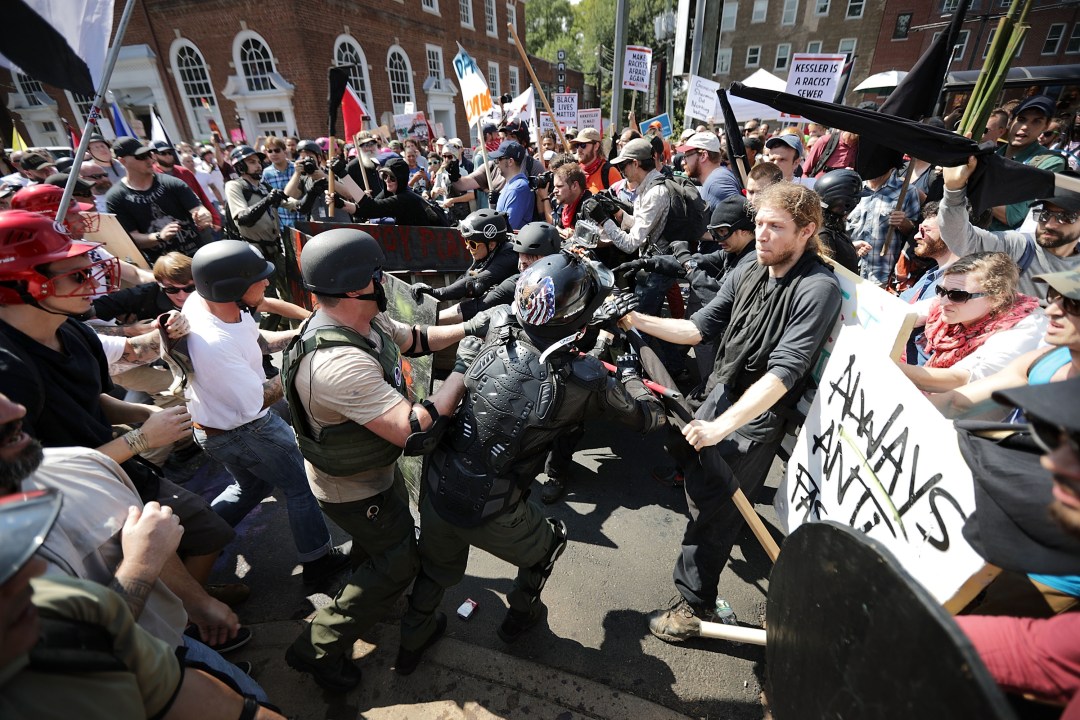There is a strain of wickedness so contagious that it infects every pore of the places it touches. It can be found in the failed human beings who snatch at glory by the mass slaughter of children; they have changed forever the towns of Dunblane, Newton and Columbine. New York and Paris have emerged from the violent fantasies of terrorists but Utøya, Enniskillen and Ma’alot likely never will. Charlottesville joins the grim roster of cities that stand as metonyms for racial hatred and intolerance. The Virginian municipality has been here before — it was ground zero of the Stanley Plan — but it is the arresting display, in 2017, of white supremacism that will forever bracket it with Selma and Birmingham.
Evil can sometimes be terribly useful. The torchlit procession of angry, paranoid adolescent men was an unmistakeable echo of the overgrown teenager in the Oval Office. The tone and character of Trumpism can no longer be denied. The sight on American streets of the swastika is shocking, perhaps enough to rattle the radical left out of its complacency. This is what happens when you cry ‘both parties are the same’ and retreat to the impossibilist fringes. The Confederate Flag, indulged as tacky emblem of hillbilly kitsch, has reasserted its traitorous roots. Good luck babbling about ‘Southern culture’ now.
Entitlement is the mother’s milk of every hideous political pathology and Trumpism is no different. A movement built to exploit the backlash against progressive identity politics, it has done so by creating its own army of snowflakes. Using what John Podhoretz calls the ‘proletarian media’, including InfoWars, the National Enquirer and wrestling TV, Donald Trump has cultivated ‘disaffected Americans entirely on the margins of American life, politically and culturally and organizationally’ and part-fostered, part-pandered to ‘rage, hatred, a sense of being wronged, and the loathing of others due to race and national origin’. This subculture is where the Trump train got on the tracks — ‘what they knew is that he didn’t dismiss them. They knew he was listening to them. They knew he wanted to talk to them, wanted to hear from them.’
Left-wing and right-wing identity politics are not only reflective but symbiotic. The ambitions of one seek vindication in the existence of the other; the excesses of each are the closest thing either has to a philosophy. Mainstream progressives and conservatives will sometimes assert their side’s good intentions, muddling the distinction between identity politics and the sometimes legitimate grievances they prey on. Importantly, intersectionalism and identitarianism (the ugliness of an idea is readily gauged by the gawkiness of its terminology) never attempt to resolve these complaints. Resentments are the building blocks of these self-fulfilling movements and the practical business of correcting injustices would eventually render them redundant.
So while the economic determinants of Trumpism matter, they do not stand alone. It’s true Trump won rural and non-graduate voters but the income picture was more complex. Four in ten low-income voters backed the Republican but a majority still opted for Hillary Clinton. Among middle earners Trump edged ahead and the candidates tied on wealthy Americans. Race is the obvious divider but while Trump took white voters, he won almost 30 per cent of Latinos with a campaign constructed around vilifying and threatening to deport large numbers of them. No, if we want to understand Trumpian identity politics, we have to look to age. Hillary Clinton walked it with under-40s but those born before America’s second centenary tended to favour her rival. The timescale involved is not coincidental.
The scenes in Charlottesville are reminiscent of European fascism but their origins are not the 1930s but the 1960s, that decade of crippling narcissism passing itself off as progress. Real progress was made in the Sixties on racial and sexual equality but those advances were achieved by solidarity and collective struggle, not individual self-aggrandisement. Only to Jim Crow segregationists and Malcolm X nationalists were civil rights primarily about identity. To Dr King and the white liberals who supported him, ending segregation, protecting the right to vote, and subduing bigotry in housing provision was a crusade for justice, to uphold the Constitution, and ultimately to enforce the outcome of the Civil War. The movements that swirled around at the same time and which have crassly appropriated the moral standing of Civil Rights — the youth movement, the anti-war movement, the counter-culture — are the legacy of the Sixties that afflicts us today.
What the hippies and flag-burners did not expect was that their politics of self-realisation would be followed 20 years later by an aggressively capitalist version of the same. The anti mission-statement of ‘turn on, tune in, drop out’ was not replaced by ‘greed is good’, just tweaked slightly. Yuppies thought themselves counter-cultural too, rebelling against their radical, right-on parents and all that dreamy talk of peace and love and living in garishly coloured submarines. Identity politics is what comes of five decades of mocking authority, prizing culture over economics, and attitudes over values. It turns universities, citadels of enlightenment, into testing grounds for grisly racial politics and allows white men to tell themselves they’ve had a right old time of it without a hint of irony.
Rage and despair are precious commodities in a new political economy where assertions trade stronger than outcomes. Hence, Donald Trump can be a liar, a bounder and a breaker of his most basic promises and still his followers will cheer. He tells it like it is and besides he’s on our side against the elites. This is what his admirers judge him on and it hardly matters that his policy record is glaringly dismal. Charlottesville is where a politics arranged around animus and grievance leads. Unless that politics is dismantled, it will not end there.








Comments